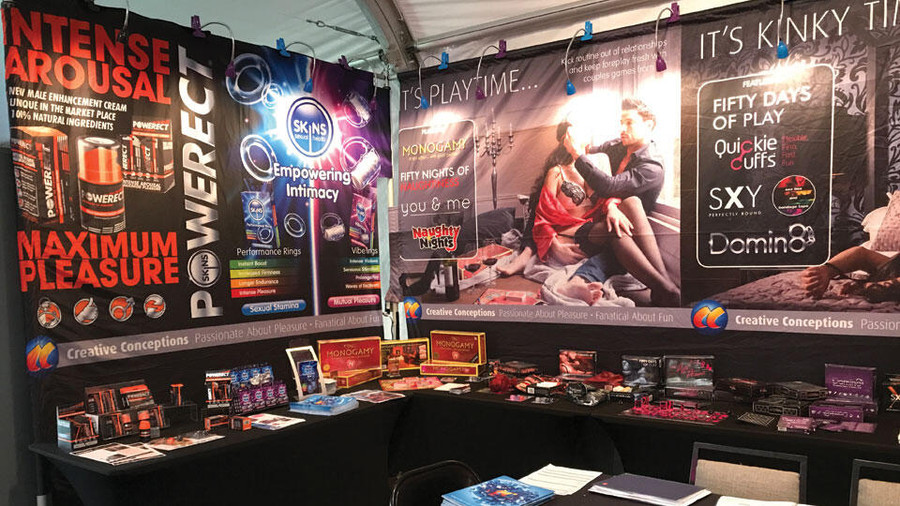For global companies, reaching international customers includes the U.S. and beyond. We sat down with some of the top internationally based companies so that they could weigh in on what it takes to successfully establish an internationally recognizable brand worldwide.
Jane and Richie Bowles at Creative Conceptions say they reach their international customers through “regular attendance at exhibitions, our website, and by having a dedicated U.S. representative whose sole job is to ensure all our U.S. customers receive the best possible service. We are proud to work with some of the U.S.’s key distributors who help make all our products readily available to retailers.”
Pleasure products have huge potential in all major economies across the world.
In the states, Creative Conceptions has a separate U.S.-based company, Creative Conceptions LLC, which ships to all domestic customers from its warehouse in Santa Ana, Calif.
“We first expanded into the U.S. back in 2012, when we started exhibiting at the XBIZ shows,” Richie Bowles said. “We found all to be very well run and provide a great opportunity to meet the lovely people in the U.S. adult industry in both a professional and social environment.”
According to the couple, when comparing the U.S. market to stores in the U.K. and other regions, there are some notable differences.
“We find that stores here are much larger than their counterparts particularly in the U.K., giving lots more space for attractive and informative point of sale,” Bowles said. “Whereas U.K. stores need to be achieving maximum return from every inch of retail space — the larger U.S. stores allow the retailer to create a total shopping experience.”
Bowles notes that with more boutique-style stores in the American market, Creative Conceptions’ couples’ games do well, and offer a strong way to encourage couples to try new and exciting experiences.
“This inevitably leads to them coming back in to the store to try out more of the ideas suggested by the games,” Bowles said.
The company has observed that one challenge when introducing a brand into any new market is the difference in legislation in each geographical region. “While this doesn’t affect games particularly, it certainly matters when introducing topical cosmetics into new markets. Our unique male enhancement cream POWERECT is manufactured in the U.S. and as such has been introduced first to the U.S. market where it has seen strong sales,” the Bowles report. “Following the success of the product we are now introducing the POWERECT brand to new markets, each one of which have their own specific demands. This creates challenges both in terms of time and investment to ensure the registration process is followed to the letter.”
The challenges of adhering to regulations and legislation aside, building any brand takes time unless you have a massive advertising budget. “Brands that grow through word of mouth and recommendation, however, may take longer to build, but do have longevity,” Bowles said. “Our best-selling board game Monogamy — A Hot Affair ... With Your Partner! was launched in the U.K. over 15 years ago, but has since grown steadily, and has now sold over one million copies worldwide in eight languages.”
The game has been featured in Cosmopolitan, recognized with awards from diverse groups including Bizzy Baby — a web forum for new mothers, and Amazon, where it hit its No. 1 spot for games on Valentine’s Day. The game even made an appearance on Fox-TV’s “Family Guy.”
To promote their brand on a universal level, the Creative Conceptions team says that marketing needs to be addressed to each specific home market.
“Although this represents its own unique challenges, each country really deserves its own uniquely targeted promotions,” Bowles said. “This is where we are indebted to our distributors, who are best positioned to promote the products in the markets where they are the specialists.”
Bowles said he is pleased with the company’s growth across all of their current markets, as consumer demand for relationship products increase. At the same time, he notes, “mainstream companies still appear to be afraid to enter the fray.”
According to Bowles, “Fifty Shades of Grey” is still driving sales internationally.
“Love it or hate it, the ‘Fifty Shades’ trilogy and films have been instrumental in legitimizing fetish play and driving sales across all brands in this sector. With Freed due out next February, we can only see this trend continuing. Sales of our new game Fetish Fun and Kinky Nights Dice bear out this trend.”
Vancouver-based premium pleasure products brand ZALO relies on “trade advertising through reputable publications and online, direct communication, and exhibiting at major trade shows such as eroFame,” Lindsay Hunt said.
She says her company has been well received in both Canada and the U.S.
“The sell-through has been strong. Sales began this past summer in the U.S.,” she said.
Hunt believes that creating an internationally recognizable brand begins with “a clear vision and intention, ZALO (Zealous, Amazing, Loyalty, Open Minded) and strong visuals that demonstrate our commitment to our quality and brand values.”
As to language barriers, she says “We currently have our app available in seven languages, and are coming out with translations on the labelling for different regions.”
Svakom digital marketing manager Anuj Saroch says international trade events and establishing a strong online presence are key to establishing a global brand.
“We have a presence on YouTube, and we also work with bloggers, YouTubers and PR agencies to publish the news and content for the best exposure.”
The company established themselves in the U.S. market in 2013, and since that time has seen its products featured online and in print magazines such as Bustle, MTV, Marie Claire, Glamour, XBIZ, CNET and Engadget.
“The U.S. market has a huge potential for pleasure products as compared to the rest of the world,” Saroch said.
Nevertheless, Saroch says that media exposure also can have its downfalls.
“Inadequate research by some bloggers before claiming that it’s easy to hack some of our tech-based sex toys like Siime Eye,” Saroch said. “In the end, it was proved by us that it’s not easy to hack the device. We suggest bloggers should do some thorough research before making false claims that may create an adverse impact on global brand image. This is the major challenge we are facing currently.”
When it comes to establishing relationships and effective communication with international distributors and retailers, Saroch describes the importance of having a “24-7 customer service team responsible for effectively responding to all emails from distributors and retailers.”
Saroch says Svakom has received an overwhelming response in the European market. “The Russian and Australian markets are growing well and these regions you can consider up-and-coming for the time being. We are mainly focusing on them now.”
As to the current state of the marketplace, Saroch says, “Pleasure products have huge potential in all major economies across the world. Currently most of the brands including Svakom are focusing on tech-based pleasure products which are currently trending at a fast pace.”
Sensual body care manufacturer Exsens is based in France and launched in Europe a little over a year before opening a U.S. office. The European office is currently spearheading marketing and sales toward Asia and Southeast Asia including Australia, while the U.S. office is looking at Canada and Central America as markets, U.S. sales manager Rebecca Pinette-Dorin says. The U.S. office is located in Providence, R.I., and handles sales, marketing and warehousing.
Expanding into the U.S. “was a no brainer,” Pinette-Dorin said. “It’s a huge market with enormous potential.”
According to Pinette-Dorin, “We have a strong online social media presence, which is really helpful for reaching end users and stores. We also send out a lot of samples — trying is buying with us,” she smiles. The “Made in France” label serves the company well, too, she says.
Comparing the U.S. market to other global markets, she adds “It’s strong, but perhaps not as eager for high-end products, though this is definitely changing.”
Marketing for different markets involves catering to each region individually, she said.
“How you market a brand for women changes drastically from continent to continent,” she said. “Also, the FDA and cosmetic certification can be onerous.”
To establish brand recognition, Pinette-Dorin says that Exsens chooses “main talking points and we link them to the brand in every situation. Images can change, tag lines can change, but Exsens will always be ‘Made in France,’ and ‘only the best ingredients,’” she said.
Pinette-Dorin says that the regions that have seen the most growth include the U.S., which she describes as growing in “leaps and bounds. China and South Korea, India and Canada are all up and coming.”
“This is an industry that does not have a down slope; it’s only going to grow for many, many years to come,” Pinette-Dorin said. “We have not even gotten close to a saturation point. Many international markets are actually rushing to catch up and there is a lot of room out there for new brands — especially quality brands. And brands are what people want — generic is out. Organic and all-natural are also huge trends that should not be ignored.”








